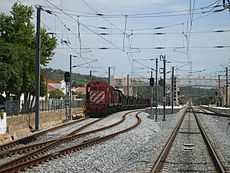Tunes (Silves)
| Tunes | ||
| Civil Parish (Freguesia) | ||
|
||
| Official name: Freguesia de Tunes | ||
| Country | ||
|---|---|---|
| Region | Algarve | |
| Subregion | Algarve | |
| District | Faro | |
| Municipality | Silves | |
| Localities | Amêndoais, Assumadas, Canais da Silva, Cortezães, Gateiras, Guiné, Poço da Figueira, Tunes | |
| Center | Tunes | |
| - elevation | 66 m (217 ft) | |
| - coordinates | 37°9′59.46″N 8°15′36.77″W / 37.1665167°N 8.2602139°W | |
| Lowest point | ||
| - elevation | 0 m (0 ft) | |
| Length | 3.786 km (2 mi), Northwest-Southeast | |
| Width | 6.8 km (4 mi), Southwest-Northeast | |
| Area | 12.8 km2 (5 sq mi) | |
| Population | 2,002 (2001) | |
| Density | 156.40 / km2 (405 / sq mi) | |
| LAU | Freguesia/Junta Freguesia | |
| President Junta | José Rodrigo Martins Cebola (PSD) | |
| President Assembleia | Armindo da Conceição Filipe (PSD) | |
| Timezone | WET (UTC0) | |
| - summer (DST) | WEST (UTC+1) | |
| ISO 3166-2 code | PT- | |
| Area Code & Prefix | (+351) 282 XX XX XX | |
| Code | 8365-235 Tunes | |
| Demonym | Silvense | |
| Parish Address | 8365-235 Tunes | |
| Wikimedia Commons: Tunes | ||
| Statistics: Instituto Nacional de Estatística[1] | ||
| Website: http://www.jf-tunes.com | ||
| Geographic detail from CAOP (2010)[2] produced by Instituto Geográfico Português (IGP) | ||
Tunes is a civil parish in the municipality of Silves, in the Portuguese Algarve.[3] In 2001 there were 2002 inhabitants, in an area of approximately 12.13 square kilometres (4.68 sq mi): there were 167 residents per kilometre square.
History
The opinion that persists around the toponomic name of the area, Tunes, is that it was so named for the number of colonists from north Africa, primarily from Tunis. Those who believe in this origin site the medieval French marigold (Tagetes patula) flower of Tunes, a herbaceous plant similar to the carnation (with cut petals and yellow flower) and common here as well as in Tunisia.
The civil parish was created on 4 October 1985, under Decree-law 130/85, making it the youngest of the parishes of Silves. The settlement developed primarily around the junction of various rail-lines that connected Lisbon to the Algarve.
In the 19th century, the locality was dominated by a few agricultural settlers who dedicated themselves to wine production. The first barrios began to appear after the railway opened in Gateiras. What was planned initially was a station would be constructed in Algoz, near the village of Tunes. But, owing to the slope of the hills, the construction of the station was differed to several kilometres to the east. The population was composed primarily of workers for the railway. On 21 February 1889, the first train passed through Tunes on the Lisbon-Faro line. It was on the same line, specifically the Tunes-Lagos link, that the last steam-powered train was used in the Algarve (in 1972).
It was also in 1972 that the first thermoelectric plant was inaugurated in the community.
The economic changes in the country over time transformed the civil parish from one of agricultural and industry to a more tourist-oriented speciality.
Geography

The parish is located 29.7 kilometres (18.5 mi) east of the main centre of Silves and, approximately 245 kilometres (152 mi) south-southeast of Lisbon.[4]
The town is most noted for a train station which is an important national transport hub.
Architecture
Civic
- Primary School of Tunes (Portuguese: Escola primária de Tunes)[5]
- Railway Station of Tunes (Portuguese: Estação Ferroviária de Tunes)[6]
Notable citizens
- Diogo do Guiné, who was accused of several crimes, escaped police forces in 1833, and refuged in a cave in the Cerro do Guiné. No one would attempt to capture Diogo, since no one could enter the caverns, fearful of other bandits who lived there, and resulting in the name Diogo do Guiné.
- Hermínio da Palma Inácio (Ferragudo, Lagoa 29 January 1922 - Lisbon, 14 July 2009), a native of Tunes, was known for his participation in sabotage plots against the regime of António Oliveira de Salazar. This included the hijacking of a TAP Sud Aviation Caravelle, en route from Casablanca to Lisbon, in 1961. He was a founder of the LUAR – Liga de União Revolucionária (League of Revolutionary Union). In 1995, he was posthumously awarded the Order of Liberty by Portuguese President Mário Soares.
References
- ↑ INE, ed. (2010), Censos 2011 - Resultadas Preliminares [2011 Census - Preliminary Results] (in Portuguese), Lisbon, Portugal: Instituto Nacional de Estatística, retrieved 1 January 2012
- ↑ IGP, ed. (2010), Carta Administrativa Oficial de Portugal (in Portuguese), Lisbon, Portugal: Instituto Geográfico Português, retrieved 1 July 2011
- ↑ Grande enciclopédia portuguesa e brasileira: Actualização, Zairol, 1998, ISBN 972-9362-16-5
- ↑ Detail Regional Map, Algarve-Southern Portugal, ISBN 3-8297-6235-6
- ↑ Fernandes, Paulo (2002), Escola primária de Tunes (PT050813080046) (in Portuguese), Lisbon, Portugal: SIPA-Sistema de Informação para o Património Arquitetónica, retrieved 13 October 2012
- ↑ Fernandes, Paulo (2002), Estação Ferroviária de Tunes (PT050813080072) (in Portuguese), Lisbon, Portugal: SIPA-Sistema de Informação para o Património Arquitetónica, retrieved 13 October 2012
